Russia committed war crimes. But are they genocide?
By Susan D’Agostino | April 14, 2022
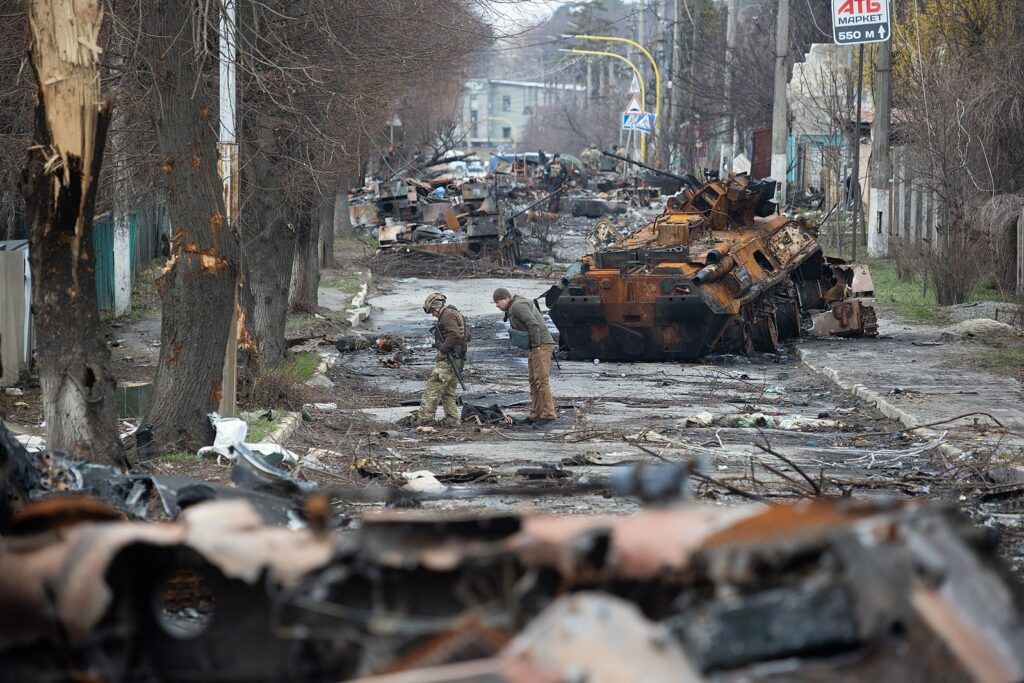 Working trip of the President of Ukraine to the Kyiv region. Creid: Official Website of the president of Ukraine. Accessed via Wikimedia Commons. CC BY 4.0.
Working trip of the President of Ukraine to the Kyiv region. Creid: Official Website of the president of Ukraine. Accessed via Wikimedia Commons. CC BY 4.0.
Russia broke international humanitarian law and committed war crimes in Ukraine by targeting civilians, a maternity hospital, and a theater, according to an Organization for Security and Cooperation in Europe report released this week. The Vienna-based organization also found “clear patterns” of additional international humanitarian law violations and war crimes. They have called for more detailed investigations.
“A damning indictment of Russia’s illegal and brutal war,” Liz Truss, UK Foreign Secretary wrote on Twitter. The report comes on the heels of President Biden’s characterization of Russia’s war as “genocide.”
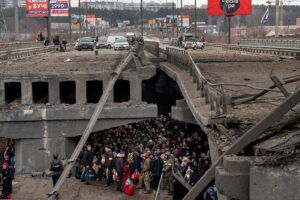
While the International Court of Justice and International Criminal Court have not (yet) tried Russia for genocide, the Organization for Security and Cooperation in Europe has delivered an early verdict on humanitarian law violations and war crimes. Russia’s March 9 attack on the Mariupol Maternity House and Children’s Hospital was “deliberate,” came with “no effective warning,” and constitutes a “war crime,” the 110-page report stated. Also, its March 16 attack on the Drama Theater in Mariupol, which was “clearly marked as housing children” and in which as many as 1,300 civilians had taken refuge, was also deliberate and constituted a war crime, the report said.
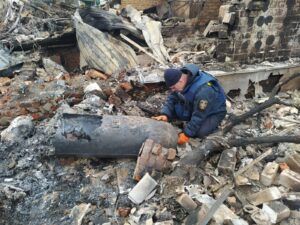
Forty-five of the 57 member countries of the Organization for Security and Cooperation in Europe supported Ukraine’s request for an investigation, which prompted three independent experts to embark on a three-week investigative mission. A dozen countries, including Russia and Belarus, did not vote in favor of the inquiry. (Ukrainian Foreign Minister Dmytro Kuleba had previously called on the organization to suspend Russia’s membership for its “unjustified aggression.”) The investigative team noted that the report should be considered “preliminary,” as they would have needed more time and forensic expertise to make a final determination. Still, they found what they called “clear patterns” of violations and crimes by Russian forces.
“It is not conceivable that so many civilians would have been killed and injured and so many … houses, hospitals, cultural property, schools, multi-story residential buildings, administrative buildings, penitentiary institutions, police stations, water stations and electricity systems would have been damaged or destroyed” if Russia had respected its international humanitarian law obligations, the report noted. Their assessment considered what’s known as the “proportionality rule” governing international humanitarian law. The rule is intended to ensure that wartime attacks on military targets do not cause excessive civilian deaths.
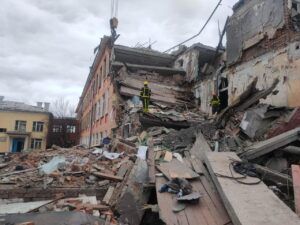
Міністерство внутрішніх справ України. Accessed via Wikimedia Commons. CC BY 4.0.
Though the team was unable to verify numerous allegations of Russian forces torturing civilians, they deemed many “credible.” These allegations included a well-documented case of a Radio France interpreter who was held in captivity for nine days, “left in an icy cellar, … repeatedly beaten with an iron bar and rifle butts, tortured with electricity, deprived of food for 48 hours, and subjected to a mock execution.” In another credible allegation of what would be an “egregious violation” of international humanitarian law, Russian forces may have executed civilians around Kyiv with their hands tied and left them in streets. Also, Russia’s apparent failure to allow civilians safe passage in humanitarian corridors could constitute a war crime if it were part of an intentional effort to deprive Ukrainian citizens of food, according to the report.
The investigative team also found credible evidence that Russia had targeted civilians—another potential war crime—including those who were walking, riding bikes, driving, traveling on trains, and spending time in their houses and yards. They noted that individuals belonging to vulnerable groups, including women, children, older persons, and persons with disabilities have suffered the brunt of these civilian attacks.
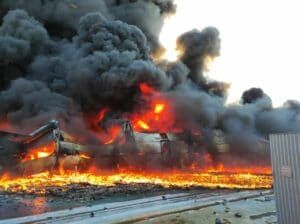
In March, Ukraine filed a petition asking the International Court of Justice in The Hague to intervene to prevent and punish what it called Russia’s plans for genocide. The United Nations defines genocide as “acts committed with intent to destroy, in whole or in part, a national, ethnic, racial, or religious group.” Earlier this week, President Biden also described President Putin’s war atrocities as “genocide.” Genocide is harder to prove than, for example, war crimes resulting in mass killings as the former requires evidence of intent.
“Your family budget, your ability to fill up your tank, none of it should hinge on whether a dictator declares war and commits genocide a half a world away,” Biden told a crowd in Iowa. He said he would “let the lawyers decide” on whether Russia’s activities constitute genocide but that “it sure seems that way to me.” Many world leaders have hesitated to use the word out of fear that doing so might impede diplomatic efforts.
A Kremlin spokesperson called Biden’s use of the word “unacceptable.” French President Macron declined to use the word, warning against an “escalation of rhetoric.” Ukrainian Foreign Ministry spokesperson Oleg Nikolenko called that response “disappointing.” Canadian Prime Minister Justin Trudeau said that it is “absolutely right” for people to describe Russia’s actions in Ukraine as genocide.
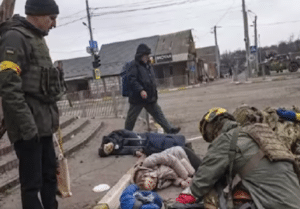
Against the backdrop of the war-crime verdict and genocide debate this week, Western countries have also been investigating allegations that Russia used chemical weapons. Ukraine’s Azov regiment, a group tied to neo-Nazis and white supremacists, said that Russia dropped chemical weapons from a drone that poisoned three people in Mariupol, though without “disastrous consequences” for health. Mariupol Deputy Mayor Sergei Orlov told the BBC that the city council had confirmed the chemical attack. Ukraine’s Deputy Foreign Minister Hanna Maliar, however, said that officials were still investigating whether chemical weapons had been used, according to the Associated Press.
Chemical weapons are outlawed under the international Chemical Weapons Convention, which both Russia and Ukraine signed. If confirmed, it would be the first known use of chemical weapons in the current war, according to Politico.
“Even war has rules,” the official website of Ukraine notes as the sound of air raid alert sirens blares. The website, which seeks to list Russian war atrocities, is verified by Ukraine’s Ministry of Foreign Affairs. While the world deliberates word choices for the atrocities, adjudicates criminal cases, and broadcasts around the world words and images of the horror in magazines like this one, Ukraine makes a brief request: “Don’t look away. Be horrified.”

Together, we make the world safer.
The Bulletin elevates expert voices above the noise. But as an independent nonprofit organization, our operations depend on the support of readers like you. Help us continue to deliver quality journalism that holds leaders accountable. Your support of our work at any level is important. In return, we promise our coverage will be understandable, influential, vigilant, solution-oriented, and fair-minded. Together we can make a difference.
Keywords: Russia, Ukraine, genocide, nuclear risk, nuclear weapons, war, war crimes
Topics: Analysis, Nuclear Risk, Nuclear Weapons















Most people think mass murder when hearing the word genocide. Often ethnic cleansing is erroneously conflated with genocide. To understand one needs to know the basic purpose behind both: Ethnic cleansing is about taking the land; Mass murder may be used as a method to accomplish that. Genocide is the destruction of a culture. Mass murder may be used as a method to accomplish that but it can be done w/o killing everyone. For example, consider China’s actions against both Tibetans and Uyghurs: In both cases the goal is the destruction on non-Han Chinese culture. Instead of mass murder forced… Read more »
It is often said that the first casualty of war is truth. Giving unverified charges the status of “credible” is an invitation to prove that saying.
Obviously, Russia is committing genocide. One of the standard definitions of genocide is the destruction of a culture or a people. Not only killing civilians, the Russian army is using what they call ‘Filtration’ – resettlement in camps in Russia, where they ‘reeducate’ Ukranians (and others they have conquered in the past) to ‘Russify’ them – to eliminate their unique culture, and force them to assimilate to Russian culture. This is identical to the methods used by the US against indigenous populations of North America. That was called genocide, so this is genocide, too. The question is not whether or… Read more »